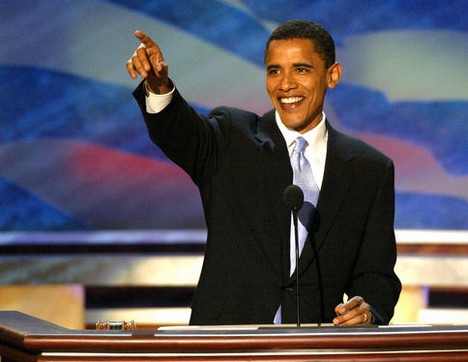Friday, August 29, 2008

DENVER — Barack Obama accepted the Democratic presidential nomination on Thursday night with a scathing assessment of John McCain and a searing indictment of the Bush administration, promising to repair "the broken politics of Washington" and preside over a more prosperous and equitable America.
Speaking to a rapturous audience of about 80,000, the largest convention crowd ever assembled, Obama delivered an address that was alternately outraged and uplifting, personal and political.
He blasted President Bush and McCain, the presumptive Republican nominee, with some of his harshest language of the campaign, painting a grim picture of economic hardship: rising unemployment, falling wages, plunging home values and rising costs for gasoline and college tuition.
"Tonight," Obama said, speaking from a specially constructed soundstage on the floor of Denver's Invesco Field, "I say to the American people, to Democrats and Republicans and Independents across this great land — enough! This moment — this election — is our chance to keep, in the 21st century, the American promise alive."
In a 40-minute speech, Obama rode a line between policy and personal revelation, between high-flown oratory and an elbow-grease appeal to the working class voters who have stubbornly eluded him throughout the campaign.
He slapped McCain even as he called for an end to Washington's partisan politics, including appeals for common ground on some of the nation's most contentious issues: abortion, gay rights, gun control and immigration.
And he addressed nearly every major criticism of himself and his campaign head-on.
After a passing salute to McCain and his heroic military service, Obama scorched his rival on issues of policy and judgment.
"I don't believe that Senator McCain doesn't care what's going on in the lives of Americans," he said. "I just think he doesn't know." And: "John McCain likes to say that he'll follow bin Laden to the Gates of Hell — but he won't even go to the cave where he lives." And "John McCain has voted with George Bush 90 percent of the time. ... I don't know about you, but I'm not ready to take a 10 percent chance on change."
Obama salted his speech with the stories of people he met on the campaign trail, suggesting he was not as exotic or distant as his mixed-race background and cool demeanor sometimes suggests.
Obama pledged "to end this war in Iraq responsibly and finish the fight against al-Qaida and the Taliban in Afghanistan;" vowed to wean the U.S. from Middle Eastern oil in a decade, and cut taxes "for 95 percent of all working families," and he said he'd pay for it all in the budget.
He declared himself "not the likeliest candidate for this office. I don't fit the typical pedigree, and I haven't spent my career in the halls of Washington." But he challenged McCain on issues domestic and foreign, declaring "If John McCain wants to have a debate about who has the temperament, and judgment, to serve as the next commander-in-chief, that's a debate I'm ready to have."
Melding his signature line and his rival's convention theme, Obama said the nation's troops "have not served a Red America or a Blue America — they have served the United States of America. So I've got news for you, John McCain: We all put our country first."
For the most important night of his political career, Obama chose a setting as audacious as his candidacy itself: a raised blue-carpeted platform at the center of a football stadium, with a backdrop of Greco-Tuscan columns and more than a dozen American flags. The campaign surrounded the stage with a multi-ethnic rainbow of delegates and filled the stands with ticket lottery winners, striving for an image at once mammoth and intimate.
The stadium fell whisper-silent as Obama's video of introduction played, a gentle, cool breeze lifting the American flags in the hands of rapt audience members.
Republicans mocked the spectacle, calling it further proof the Democratic nominee was an empty-suited celebrity smitten with himself. McCain was hoping to steal back a bit of the limelight today by announcing his vice presidential pick.
Whatever happens in November, the night presented a testimonial to racial progress in America, a nation founded by slave owners and cleaved by civil war and more than a century of acrimony that followed.
Less than 50 years after African-Americans were prevented from voting in some states, Obama became the first African-American to accept the presidential nomination of one of the country's two major political parties.
Adding to the historic resonance, Obama delivered his speech on the 45th anniversary of the Rev. Martin Luther King Jr.'s "I Have a Dream" address. "Let freedom ring from the snowcapped Rockies of Colorado!" King said that day; Obama's triumph, standing in the shadow of those mountains, suggested the country was closer to the colorblind society King saw in 1963 from the steps of the Lincoln Memorial.
Democrats hardly mentioned the historic nature of Obama's nomination for most of the night, until the candidate himself, at the end of his speech, borrowed the 45-year-old words of the man he called "the preacher."
As Obama quoted Martin Luther King: " 'We cannot walk alone,' the preacher cried. 'And as we walk, we must make the pledge that we shall always march ahead. We cannot turn back.' "
"America," Obama concluded, "we cannot turn back. We cannot walk alone. At this moment, in this election, we must pledge once more to march into the future. Let us keep that promise — that American promise — and in the words of Scripture hold firmly, without wavering, to the hope that we confess."







